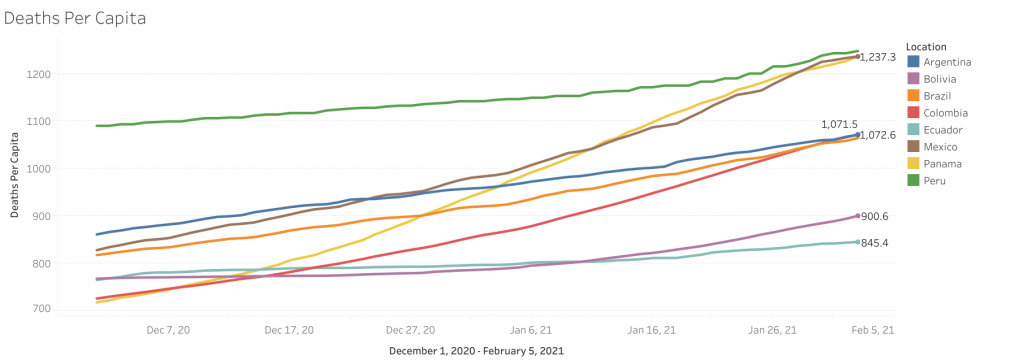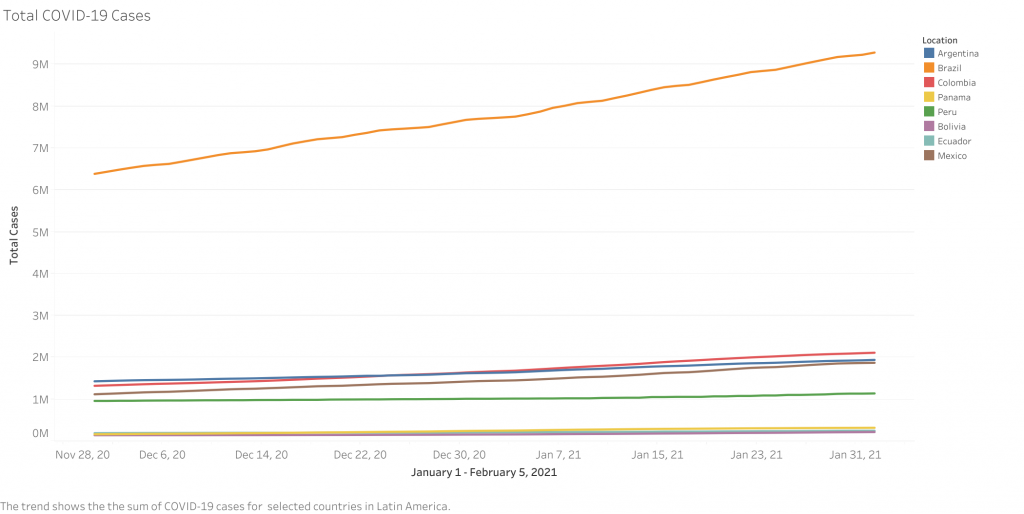What you should know
- COVID-19 Response Rankings: Uruguay is top ranked in Latin America (#12 of 98 countries measured globally); Brazil is lowest ranked (#98 globally.)The Lowy Institute’s Covid Performance Index looks at pandemic management across six indicators: confirmed cases, confirmed deaths, cases per million, deaths per million, confirmed cases as a proportion of tests, and tests per thousand people.
- Barbados Declaration: On February 2, regional environment ministers signed on to a call for environmental issues to be placed at the heart of the COVID-19 recovery strategy. The Barbados Declaration also calls for economic reactivation based on social inclusion, low carbon and resilient economies, and the conservation and sustainable use of natural resources.
- Corruption and COVID-19: Transparency International’s 2020 Corruption Perception index found corruption to be prevalent across government’s COVID-19 response. In the Americas, Canada, Uruguay, United States, and Chile are the best performers; Nicaragua, Haiti, and Venezuela are the worst.
- 35 million doses: The Pan American Health Organization (PAHO) expects the deployment of COVID-19 vaccines to Latin American and Caribbean through the COVAX facility to begin in mid-February and last until the end of June. Over 35 million doses will be delivered to 36 countries.
- 159,533: Mexico surpassed India to record the third highest number of COVID-19 deaths on January 28. Here are this week’s figures.
Health + Innovation
Countries in the region continued to announce new procurement agreements and approvals, although some countries are experiencing delays in shipments of COVID-19 vaccines.
- Chile: On February 3, Chile launched an ambitious vaccination plan with a target of inoculating five million citizens by the end of March. The country began vaccinations on December 24, 2020. It has received nearly four million doses of China’s Sinovac vaccine and is set to receive nine million more doses between February and early March.
- Sputnik V: On February 2, a study published in The Lancet found Russia’s Spuntik V vaccine to be 92 percent effective against COVID-19. Mexico approved the Sputnik V vaccine hours after the publication. Hugo López-Gatell, Undersecretary of Prevention and Health Promotion at the Mexican Secretariat of Health, said the government signed a contract for 400,000 doses that will arrive later this month.
Colombia is also in talks with Russia’s Gamaleya Institute to acquire doses of its Sputnik V vaccine. Separately, the health ministry is developing a plan to provide vaccines to immigrants through the COVAX mechanism.
Similar to production issues faced by Pfizer and AstraZeneca, on January 27, Russia announced its supply of Sputnik V vaccines to Latin America may be delayed up to three weeks.
- Vaccine access: Indigenous leaders urged governments to ensure COVID-19 vaccines reach tribal communities. More than 1.7 million COVID-19 cases have been registered among indigenous people living in the Amazon basin.
- Manaus: The COVID-19 variant first detected in the Brazilian city of Manaus, called by scientists the P.1. variant, is believed to have a higher infection rate than the novel COVID-19 (SARS-CoV-2) virus. According to Brazilian scientific institution Fiocruz, the P.1 variant was identified in 91 percent of all COVID-19 cases reported in January in Amazonas state. The variant has been detected in nine countries, including Japan and the United States.
Economies in focus
Multilateral Analysis
- Alicia Bárcena, Executive Secretary of the Economic Commission for Latin America and the Caribbean, called on the Mexican government to implement a fiscal reform to increase social assistance programs, including guaranteeing support to small- and medium-sized firms.
Economic Relief
- Since the start of the pandemic, El Salvador has announced nearly $1 billion in funding to address the COVID-19 pandemic. Seventy percent of the funds come from new external debts.
- Argentina is seeking a deal with the IMF regarding $44 billion in debt. Economy Minister Martin Guzmán will decrease the government’s 2021 budget by 6 percent to try to secure the deal; the economy fell by 12 percent in 2020.
- CAF-Development Bank of Latin America will partner with Paraguay to provide technical assistance and loans to small- and medium-sized firms to mitigate the effects of the pandemic.
Economic Impact
- Costa Rican Tourism Minister Gustavo Segura predicts that, similar to 2020, the country will receive only one-third of the tourists this year that it received in 2019. The Costa Rican hotel and restaurant sector shrank by 40 percent last year.
Quarantine + Travel Restrictions
Countries in the region continue to try and strike a delicate balance between containment measures and economic activity as new variants spread throughout the region.
Quarantine and Reopening Plans
- Bogotá lifted a city-wide red alert following a decrease in ICU occupancy from 94 percent to 81 percent. The mayor lifted quarantines throughout the city on February 3.
- Panama has begun to reopen its economy after a decrease in new COVID-19 cases. The government allowed three provinces to resume activities on February 1.
- On February 1, Mexico reported 3 more states had been classified as maximum risk (red) per the country’s four-colored traffic light system. Thirteen of Mexico’s 32 states are classified as maximum risk (red), 17 are classified as high-risk (orange), and two are classified as medium risk (yellow). None are classified as low risk (green).
International Travel Restrictions
- Ecuador will present a proposal to gradually reopen its borders with Colombia and Peru in the coming days. The proposal comes amid criticism aimed at Peru and Ecuador for deploying military troops to their borders to halt the unauthorized flow of migrants.
- Canada has suspended flights to Mexico and all Caribbean destinations until April 30 due to concerns over new COVID-19 variants.
- Brazil’s neighbors are restricting travel with the country to prevent the spread of the P.1 variant. Argentina will half its flights to Brazil beginning February 1. Peru and Colombia have suspended all flights with Brazil.
- Beginning February 6, Cuba will reduce flights to Mexico, the United States, Panama, the Dominican Republic, Colombia, and the Bahamas as COVID-19 surges on the island.
In Focus: Ecuador’s Election
On February 7, Ecuadorians will head to the polls to elect a new national assembly, president, and vice president. Leading the polls are Andrés Arauz and Guillermo Lasso, although neither candidate is expected to secure enough of the vote to avoid an April 11 runoff.
The winning candidate will enter office in the middle of a public health crisis that caused an economic contraction of 9.5 percent in 2020. In the January 17 debate, Andrés Arauz said Argentina would donate 4.4 million AstraZeneca vaccines. Argentine President Alberto Fernández has since issued a letter clarifying AstraZeneca operates independently of the government, although he pledged to intercede with the company on Ecuador’s behalf. Guillermo Lasso has also pledged to vaccinate 9 million Ecuadorians (slightly over half the population) in his first 100 days, although he has released few details.
In attempt to limit the spread of the virus during the voting procedures, the Colegio de Médicos del Guayas has proposed a minimum biosecurity protocol for the country’s national electoral commission, including a strict curfew following the election, the obligatory use of masks, and PCR testing for poll workers.
By the numbers
- Cases by country: Brazil (9,286,256) #3 worldwide, Colombia (2,114,597) #11 worldwide, Argentina (1,943,548) #12 worldwide, Mexico (1,874,092) #12 worldwide, Peru (1,149,764) #18 worldwide, Chile (736,645) #24 worldwide, Panama (322,201) #41 worldwide, Ecuador (251,279) #48 worldwide, Bolivia (220,426) #53 worldwide, Dominican Republic (217,277) #54 worldwide, Source: worldometers.info
- Prevalence rate (total cases per million people: Panama (73,989) #9 worldwide, Aruba (65,661) #14 worldwide, Brazil (43,505) #35 worldwide, Argentina (42,771) #36 worldwide, Colombia (41,298) #39 worldwide, Chile (38,341) #48 worldwide, Costa Rica (38,076) #49 worldwide, Saint Martin (31,598) #60 worldwide, Belize (29,754) #63 worldwide, Bahamas (20,793) #79 worldwide, Source: worldometers.info
- Deaths per capita (deaths per million people): Peru (1,244) #19 worldwide, Mexico (1,230) #20 worldwide, Panama (1,226) #21 worldwide, Argentina (1,066) #25 worldwide, Colombia (1,066) #26 worldwide, Brazil (1,061) #28 worldwide, Chile (967) #32 worldwide, Bolivia, (893) #35 worldwide, Ecuador (838) #38 worldwide, Belize (754) #41 worldwide, Source: worldometers.info
Quick take


